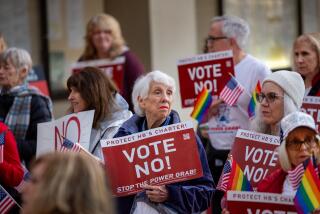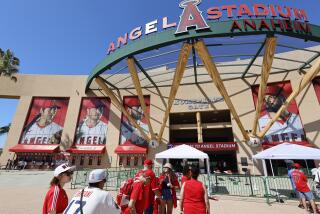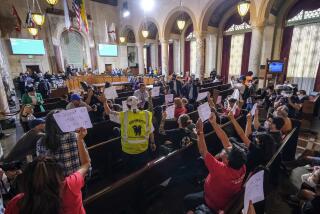BREA : Town Hall Meetings Planned for City
- Share via
Taking cues from President-elect Bill Clinton, Brea Mayor Burnie Dunlap has vowed to bring the city government closer to the people through electronic media and town hall meetings.
At Tuesday’s City Council meeting, Dunlap said the televised previews of City Council agendas--started last month--will continue and council presentations on other topics will also be broadcast on Channel 3, the city’s cable channel.
If approved by education officials, the town meetings will be conducted in the city’s six elementary schools, he said.
“The format will be to listen to our citizens in a relaxed setting,” Dunlap said.
In addition, Dunlap plans to hold regular office hours every Monday from 8:30 to 9:30 a.m. and will return calls to the “Dial-the-Mayor” telephone hot line within 48 hours. The number is (714) 671-4488.
Some residents have previously accused city government of being out of touch.
Dunlap has proposed drafting a Code of Conduct for city officials, including members of the council and various committees and commissions, dealing with ethics and professional conduct toward citizens, staff and each other.
In the past two years, two members of the council were charged with violating conflict-of-interest laws. Ron Isles, a former mayor, pleaded guilty to seven of the 21 charges against him and is serving a three-year probation.
Former Mayor Wayne D. Wedin was found not guilty of the charges filed against him. The city provided $25,000 for his legal defense.
Dunlap said his economic policy will emphasize completion of the downtown redevelopment project, the Historic Block project and efforts by the Brea Economic Development Committee to attract new businesses to the city.
At the council meeting, Dunlap also announced that Mayor Pro Tem Glenn G. Parker will monitor development of the seven-square-mile unincorporated area outside current city limits--an area expected to be annexed soon.
The annexation would enlarge the city’s area by 70%. Parker will take the lead in involving the community in such concerns as open space, parks and recreational facilities, historical landmarks and other issues.
“I will consider 1993 a success,” Dunlap said, “if the community looks back with pride and says, ‘I’m better informed, I have a better understanding, and my views were considered.’ ”
More to Read
Sign up for Essential California
The most important California stories and recommendations in your inbox every morning.
You may occasionally receive promotional content from the Los Angeles Times.













